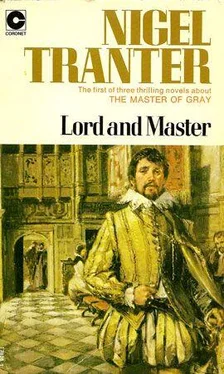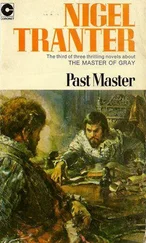Nigel Tranter - Lord and Master
Здесь есть возможность читать онлайн «Nigel Tranter - Lord and Master» весь текст электронной книги совершенно бесплатно (целиком полную версию без сокращений). В некоторых случаях можно слушать аудио, скачать через торрент в формате fb2 и присутствует краткое содержание. Жанр: Исторические приключения, на английском языке. Описание произведения, (предисловие) а так же отзывы посетителей доступны на портале библиотеки ЛибКат.
- Название:Lord and Master
- Автор:
- Жанр:
- Год:неизвестен
- ISBN:нет данных
- Рейтинг книги:4 / 5. Голосов: 1
-
Избранное:Добавить в избранное
- Отзывы:
-
Ваша оценка:
- 80
- 1
- 2
- 3
- 4
- 5
Lord and Master: краткое содержание, описание и аннотация
Предлагаем к чтению аннотацию, описание, краткое содержание или предисловие (зависит от того, что написал сам автор книги «Lord and Master»). Если вы не нашли необходимую информацию о книге — напишите в комментариях, мы постараемся отыскать её.
Lord and Master — читать онлайн бесплатно полную книгу (весь текст) целиком
Ниже представлен текст книги, разбитый по страницам. Система сохранения места последней прочитанной страницы, позволяет с удобством читать онлайн бесплатно книгу «Lord and Master», без необходимости каждый раз заново искать на чём Вы остановились. Поставьте закладку, и сможете в любой момент перейти на страницу, на которой закончили чтение.
Интервал:
Закладка:
'God be good! And this is the creature who would follow me upon England's throne!'
'No doubt he will nurture England's trade to unheard-of heights, Majesty!'
She stared at him. 'Does he know of this paper, then?'
'No. No one knows of that paper, save only ourselves. I pray you that you do not reveal whence and when you obtained it.'
The Queen smiled thinly, for the first time in that interview. I can understand your concern on that matter, Master Patrick,' she said. 'I can keep a secret better than most women, I believe.'
'So I judged – since it puts my life into your hands!'
'So it does, Patrick! So it does. And that you judged also, I have no doubt, Knowing something of weak women. Indeed, you know women too well, I think.' With a somewhat laboured return to her favourite coquettish pose, Elizabeth blinked weary eyes and simpered. 'Some day I shall perhaps consider how suitably to handle that life you have put within these hands of mine. Eh, Patrick? But…not tonight Ah, no – tonight I am tired. Tonight I would sleep, not dally – if I may. Go now, Master of Gray – your mission well accomplished. Poor Walter will be asleep out there, I do declare – if he is not already bedded down with one of my Sluts of Honour!' She yawned elaborately. 'Off with you, man. I do not know whether to thank you, or no!'
He kissed her thin hand. 'Thanks I do not seek. Only and always, your esteem, lady.'
'M'mmm.' At the door, she touched his arm. 'Tell me, Patrick, what says your honest and beloved brother to this matter?
Her visitor's whole visage, even carriage, seemed to change before her, his handsome features hardening strangely as though into stone, his fine eyes going almost blank, flintlike. 'A good evening to you, Madam,' he said, gratingly, and turning, without so much as a bow, he stalked out
For long the Queen looked after his striding upright figure.
It was almost morning before Patrick Gray arrived back at his lodgings. David, who had lain more or less awake and waiting all the night, heard him come in, reeling drunk. Never before had he seen his brother thus. It was, he adjudged, the final proof and evidence of the failure of the mission. Sick at heart, he got him to his bed, with difficulty but with a great sympathy.
The very next day, the Scots ambassadors, silent, depressed, rode north again for their native land. It was the first of February.
Chapter Thirty
THAT same first day of February, Elizabeth Tudor signed the death-warrant of Mary, Queen of Scots, in her Palace of Greenwich, in a state of near-hysteria. After snatching at her pen and signing, she dropped the paper on the floor beside her chair, and refused thereafter even to acknowledge its existence. Bitterly she complained that surely somewhere amongst her supposedly loyal and loving subjects was one with enough true affection for her to spare her the odium of this necessary task, to settle the matter of Mary without this unhappy warrant being needed? Davison, her Secretary, stooped to pick up the fatal document thankfully, even gleefully, and conveyed it with all haste to Walsingham.
There followed some delay. Walsingham, knowing his mistress only too well, to cover his own head put to Sir Amyas Paulet, Mary's gaoler at Fotheringay, Elizabeth's expressed wish that, now that Mary's fate was sealed, it would save a deal of trouble if her death could be achieved quietly, without fuss, and without further involving the Queen. As the only man with access to the prisoner, it would have to be done by himself-Sir Amyas – or at least with his connivance and arrangement. Undoubtedly, the Queen's gratitude would be very substantial for any such loyal help.
Paulet, however, could not be brought to see that this was his duty. Hard and unsmiling Puritan as he was, he insisted in putting private morals into public practice. The very qualities which made him a sure and incorruptible gaoler now turned him quite against this other service. He claimed stubbornly that he had lived an honourable life to date, and that though his heart was the Queen's and his head at her disposal, he did not propose to turn assassin at this time of his life.
That, however, was enough for Walsingham. Two men now stood between him and any monarchial second thoughts or scapegoat-making – Davison and Paulet. His own position was well secured. He gave the necessary orders for carpenters, witnesses, headsman and the like.
Mary of Scotland was executed on February 8th, the day that Patrick Gray and his colleagues rode across the Border into their own country. She died as she had lived for these last eighteen years, courageous, dignified, with spirit, even a trace of humour, professing the Catholic faith and her hope in God's mercies for her undoubted sins. The headsman made something of a botch of the first stroke – it was said, owing to tears in his eyes -but managed to sever her lovely neck at the second.
The church-bells pealed out joy and triumph all over England, thereafter; in London crowds sang and danced in the streets; bonfires were fit, largesse was distributed, loyal addresses were delivered, and Parliament sent a deputation to congratulate the Queen oh her blessed and God-sent deliverance.
Elizabeth took to her bed and would see no one.
In Scotland, the Master of Gray and Sir Robert Melville reached Stirling and conveyed their fears to their royal master and his Council, informing that Elizabeth was sore set on carrying out her terrible intent, each ambassador vouchsafing for the other that all that could have been done to save the royal prisoner had been done – Sir Robert even pointing out that he believed them fortunate to have escaped with their own lives, such was the violence of Elizabeth's wrath. In private, Patrick assured the King that while utterly determined, Elizabeth was not quite so wrathful as she must seem publicly, and had listened with patience to his royal demands for amends; he thought that he could promise an increase to the pension, and possibly even an additional lump sum, but that, unfortunately, there was still no great probability of an Act naming James as Second Person and official successor to the English throne.
Scotland waited, therefore, and though James did so in nail-biting agitation, and members of his Council may have fretted in some alarm, by and large the country lay quiet, seemingly almost apathetic -readily explainable in the sheer disbelief of ordinary people that one queen could cold-bloodedly order the death of another.
Exactly one week after the ambassadors' return, another traveller, weary and unescorted, galloped over the Border -one Roger Ashton, an extra Gentleman of the King's Bedchamber, who had been in London on routine state business. He sought the King in private audience at Stirling. Mary, His Grace's royal mother, was dead, he reported.
Suspense over, James put a brave face on it, After ordering that, since this was a purely private and unofficial intimation, no word of it was to be publicly announced, he conferred with Patrick and Maitland about suitable steps to take, consonant with proper dignity and filial duty. Patrick had his advice ready, and Maitland agreed sardonically that it could hardly be bettered in the circumstances. Lord Maxwell Kerr of Ancrum, and young Ferniehirst, son of the late unfortunate Warden of the Middle March, were sent for, as two suitably fiery yet accessible and therefore disciplinable Border leaders – with orders to muster their clan.
Six days later Sir Robert Carey, son of old Lord Hunsdon, Elizabeth's own cousin-german, arrived at the Border at Berwick-on-Tweed, as official courier and envoy of his Queen. On the King's orders he was halted there, and required to answer whether or no it was true that the King's mother had been cruelly done to death. On his admission that Mary was dead indeed, but that he had a letter from the Queen explaining all, he was told that the King of Scots would on no account receive him, and was kept kicking his heels at Berwick until Sir Robert Melville and Home of Cowdenknowes were sent south to interview him and relieve him of his letter. Seldom had an official English ambassador been so scurvily treated.
Читать дальшеИнтервал:
Закладка:
Похожие книги на «Lord and Master»
Представляем Вашему вниманию похожие книги на «Lord and Master» списком для выбора. Мы отобрали схожую по названию и смыслу литературу в надежде предоставить читателям больше вариантов отыскать новые, интересные, ещё непрочитанные произведения.
Обсуждение, отзывы о книге «Lord and Master» и просто собственные мнения читателей. Оставьте ваши комментарии, напишите, что Вы думаете о произведении, его смысле или главных героях. Укажите что конкретно понравилось, а что нет, и почему Вы так считаете.












